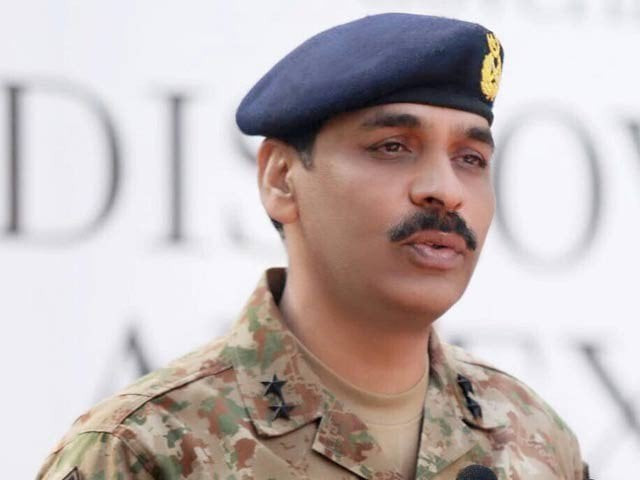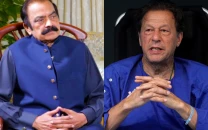Hafiz Saeed’s arrest a policy decision: army
Maj Gen Ghafoor says the step was taken by the state in ‘best national interest’

Maj-Gen Asif Ghafoor. PHOTO: ISPR
Speaking at his maiden news conference at the General Headquarters in Rawalpindi, Director General Inter-Services Public Relations (ISPR) Maj Gen Asif Ghafoor said state institutions had taken the decision in the best national interest and the situation would be cleared up further in the coming days.
JuD chief Hafiz Saeed put under house arrest
Saeed, suspected mastermind of the November 2008 Mumbai attacks, was placed under house arrest on Monday in a government move which is part of a series of steps to meet international obligations.
The government justified Saeed’s detention by citing JuD’s involvement in activities harmful to peace and security as well as in violation of UN Security Council resolution 1267. The council designated Saeed as a terrorist and his outfit as a terrorist organisation in December 2008 following the Mumbai attacks. The US also subsequently blacklisted him and his organisation, and placed $10 million bounty on his head.
The timing of Pakistan’s decision to act against JuD chief raised many eyebrows as questions are being asked as to why Pakistan had taken so long to implement the Security Council resolution. One conjecture is that Islamabad’s move is aimed at deflecting possible pressure the new US administration might exert on Pakistan on the issue. Some reports also claimed that China was reportedly instrumental in this move.
But the DG ISPR denied that the decision was taken due to any foreign pressure saying “sovereign and independent states take decisions in the best national interest and whatever decision Pakistan takes is in the national interest.”
Public ownership by the army over government’s decision suggested that the civil-military leadership appears to be on the same page. Military sources said Pakistan had decided in principle to eliminate all militant groups and the latest decision showed the country’s resolve to achieve that goal.

A retired military official, who once advised the previous government on national security matters, told The Express Tribune that the current army chief’s approach seemed to be more in tune with the civilian government as far as dealing with certain militant outfits were concerned. “And that is why now you have more clarity on issues that in the past were shrouded in mystery,” the retired general said while requesting not be quoted on the record.
Opposition protests against Hafiz Saeed’s house arrest
Another signal of a possible change that the army dropped was a statement by the chief military spokesperson emphasising the need for meaningful dialogue with India to resolve all outstanding issues including Kashmir. “India is our neighbouring country and we don’t want war with it because war is no solution to any problem,” he said.
The military spokesperson, however, cautioned that Pakistan’s policy of seeking peaceful dialogue with India should not be construed as its weakness. He said India forces had committed at least 945 ceasefire violations along the Line of Control and working boundary during last three years. “In last four months alone as many as 314 ceasefire violations committed by the India forces as a result of which 46 civilians embraced Shahadat,” Maj Gen Ghafoor said.
He said in retaliatory actions, at least 40 Indian soldiers were killed, though, according to him, Indian army was hiding its casualties from the Indian public. The army spokesperson said India was carrying out such ceasefire violation with a well thought-out strategy in a bit to divert the world attention from the current uprising in Indian controlled Kashmir.
Pakistan’s anti-terror gains
Giving an overview of the ongoing fight against terrorism, the spokesperson said Pakistan had evolved a comprehensive strategy to eliminate all forms of terrorism and extremism in 2008.
He said at that time no part of Pakistan was safe as terrorists were carrying out attacks at will. But after the comprehensive strategy, the army initiated a first major offensive from Bajaur in 2008.
The campaign later extended to other tribal regions including Mohmand, South Waziristan, Swat, Khyber, Kurrum and Orakzai agencies.
And finally security forces went into the North Waziristan Agency, which was once known as hotbed of local and foreign militant groups.
He said as a result of those operations, security situation had significantly improved in the country. Pakistan, he said, achieved these gains after paying huge sacrifices. As many as 21,839 people lost their lives while close to 49,000 suffered injuries.
India urges 'credible crackdown' following Hafiz Saeed’s detention
Maj Gen Ghafoor said due to Operation Zarb-e-Azb, security situation along the Pak-Afghan border had also improved. “This will certainly also benefit Afghanistan,” he maintained. He hoped that Afghanistan would also undertake similar steps on its side of the border to check the movement of terrorists.
Expressing concerns over the current situation in Afghanistan, the spokesperson said Pakistan was standing shoulder to shoulder with the neighboring country in this hour of need. Talking about the situation in Balochistan, the DG ISPR said law and order in the province was gradually improving due to the campaign by law enforcement agencies there. He said security forces had successfully carried out operations against terrorists in Balochistan who were backed by Indian RAW and Afghanistan’s NDS. At least 3000 intelligence based operations had so far been conducted in the province, he told reporters.
When asked about the case of missing bloggers, he said Pakistan Army had nothing to do with the disappearances of the bloggers. “We do not think that the interior minister’s statement that he would talk to intelligence agencies to recover the missing bloggers, or saying that it’s not the state’s policy, was to implicate someone,” Maj Gen Ghafoor said.
“A state has tools and instruments which it uses to implement a certain decision and we don’t think that the interior minister accused anyone [of involvement in disappearances].” Armed forces and intelligence agencies are also part of the state and the bloggers were recovered as a result of the state’s efforts, the DG ISPR added.
Published in The Express Tribune, February 1st, 2017.



















COMMENTS
Comments are moderated and generally will be posted if they are on-topic and not abusive.
For more information, please see our Comments FAQ